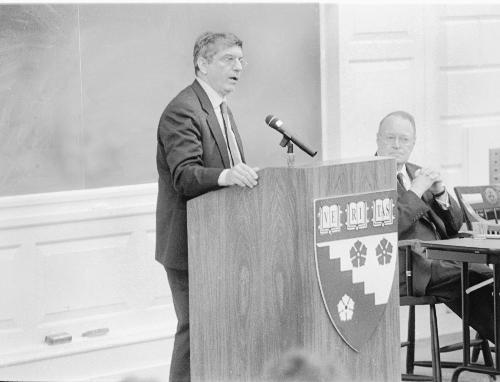
News
Summers Will Not Finish Semester of Teaching as Harvard Investigates Epstein Ties

News
Harvard College Students Report Favoring Divestment from Israel in HUA Survey

News
‘He Should Resign’: Harvard Undergrads Take Hard Line Against Summers Over Epstein Scandal

News
Harvard To Launch New Investigation Into Epstein’s Ties to Summers, Other University Affiliates

News
Harvard Students To Vote on Divestment From Israel in Inaugural HUA Election Survey
U.S. ‘Isolationism’ Criticized

Former Colombian President Cesar Gaviria called for an end to U.S. isolationism in a lecture at the Graduate School of Education yesterday.
Gaviria, who is currently Secretary General of the Organization of American States (OAS), emphasized that the U.S. had an important role to play in Africa, Asia and Latin America.
“A lot more collective action is needed,” Gaviria said. “I expect to see significant improvements in North American-Latin American relations.”
The thirty-minute talk focused on the social, economic, and political problems in Latin America in the aftermath of the September 11th attacks.
The economic slowdown in the United States following the attacks—in conjunction with economic downturns in Japan and Europe—has caused foreign investors to withdraw money from the Latin American economy, Gaviria said.
“With any information [of] economic difficulties, capital moves away from Latin America,” he said.
He questioned analyses predicting an upturn in the near future, but expressed hope that a pan-American free trade agreement, which is currently in the works, would be signed and approved by 2005.
Gaviria also emphasized that social issues, especially human rights, the treatment of minorities, poverty, health and education needed to be addressed.
The talk was sponsored by the Rockefeller Center for Latin American Studies, the Kennedy School of Government’s Latin American Student Association, the Colombian Colloquium at Harvard University, and the Colombian Student Association at MIT.
One audience member asked Gaviria to talk specifically about terrorism, drawing on his experience as Colombian president.
Gaviria responded that Colombia has long had guerrilla warfare within its borders, and that the renewed attention to terrorism will help Colombia manage the problem more effectively.
“[Guerrilla warfare] is a complex situation.... The world’s closing tolerance for terrorism and political violence will help Colombia,” he said. “Colombia doesn’t have the capacity to handle the situation alone, but a better international environment will help.”
Following the event, a Colombian audience member, Carlos Camelo, president of the International Students Association at Salem State College, said that he attended the lecture because he was impressed with how Gaviria was faring at OAS.
Camelo said he was expecting to hear more about “how terrorism will affect Latin America in the upcoming years.” But, he added, “perhaps the economic and social relations of Latin America and the United States are just as important.”
Want to keep up with breaking news? Subscribe to our email newsletter.
